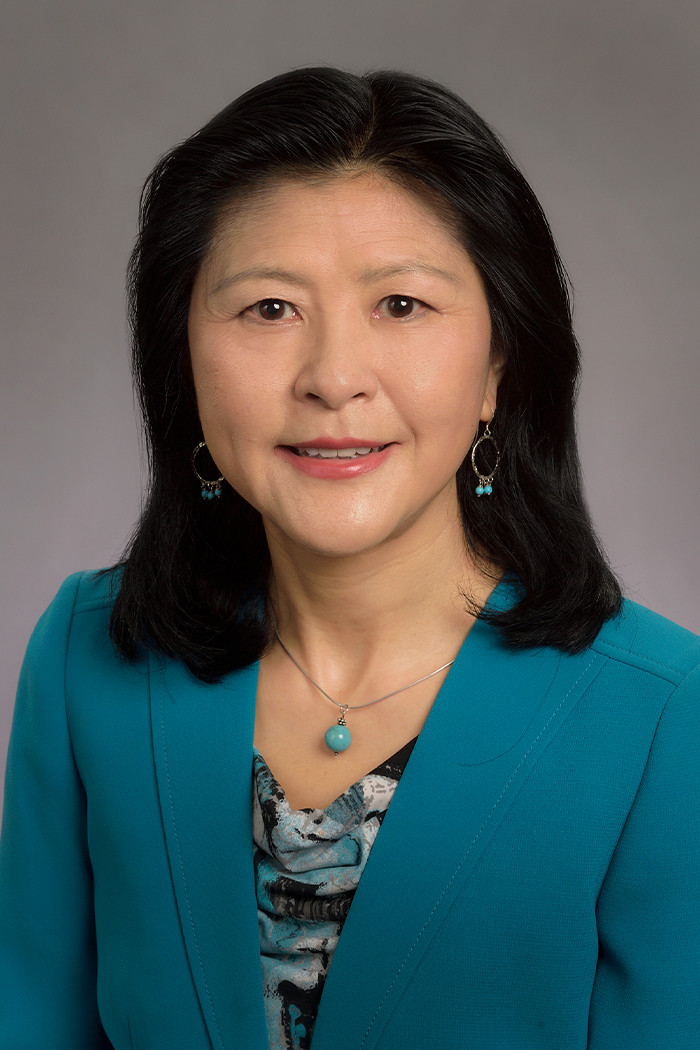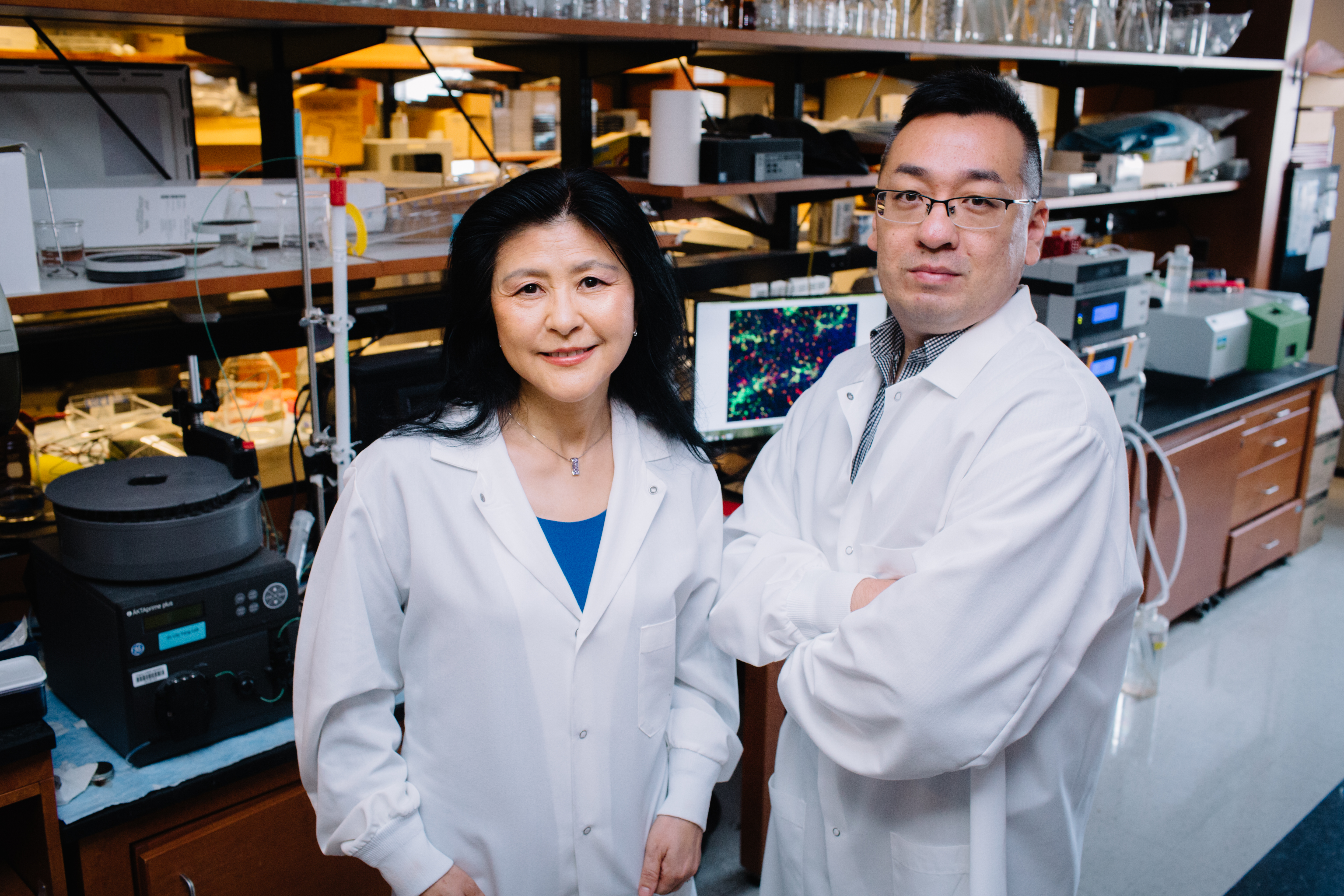Overview
The Emory Surgical Oncology Nanomedicine Research Lab focuses on translational cancer research, specifically the development of novel cancer imaging techniques and targeted therapeutic agents. The lab is led by Lily Yang, MD, PhD, Professor and Nancy Panoz Chair of Surgery in Cancer Research at the Emory University School of Medicine, and a member of the Winship Cancer Institute.
Dr. Yang's extensive research expertise spans targeted drug delivery, tumor stroma modulation, cancer gene therapy, molecularly targeted cancer treatment, nanoparticle imaging probes, cancer immunotherapy, and theranostic nanoparticles for combined imaging and therapy.
Dr. Yang is a member of the Discovery and Developmental Therapeutics Research Program at the Winship Cancer Institute and a Fellow of the American Institute for Medical and Biological Engineering. Her research is supported by multiple NIH grants and is aimed at addressing key challenges in clinical oncology, including early cancer detection, targeted drug delivery, overcoming drug resistance, activating immune responses, and monitoring therapeutic outcomes.
In addition to her immediate lab staff, Dr. Yang works with numerous Emory faculty collaborators, including radiology and imaging scientist Dr. Hui Mao; surgical oncologists Dr. Charles Staley, Dr. David Kooby, and Dr. Toncred Styblo; vascular surgeon Dr. Luke Brewster; transplant immunologist Dr. Mandy Ford; cancer immunotherapists Dr. Rafiq Sarwish, Dr. Edmund Waller, Dr. Trent Spencer, Dr. Chrystal Paulos, Dr. Gregory Lesinski, and Dr. Periasamy Selvaraj; radiation oncologist Dr. David Yu; vascular bioengineer Dr. Hanjoong Jo; and pathologist Dr. Xiaoxian Li.
Primary Research Objectives and Current Projects
Research Objectives
- Develop novel theranostic nanoparticles that overcome drug delivery barriers in tumors to enable image-guided therapy for drug-resistant cancers, particularly breast, pancreatic, and colon cancers.
- Create precision medicine strategies that integrate multifunctional nanoparticles and advanced imaging to enhance patient response and survival while minimizing systemic toxicity.
- Design targeted nanoparticles that efficiently deliver drugs and immune-activating agents while reducing cardiovascular side effects.
- Conduct preclinical studies to support the clinical translation of multifunctional, targeted nanoparticle therapies for advanced and drug-resistant cancers.
Current Projects
-
Pancreatic Cancer Therapy
Development of targeted, stroma-penetrating chemo-/immunotherapy nanoparticles with MRI capability for image-guided treatment of pancreatic cancer. -
Colon Cancer Immunotherapy
Development of a novel immunotherapy nanoparticle that inhibits colon cancer growth, enhances immune response, reduces cardiovascular side effects of immune checkpoint inhibitors, and improves atherosclerosis outcomes. -
Clinical Translation of Nanoparticle Therapy
IND-enabling preclinical studies to advance a targeted hyaluronic acid-based nanoparticle drug into a clinical trial for advanced pancreatic cancer. -
Enhancing CAR T Cell Therapy
Development of innovative strategies to improve the delivery and therapeutic efficacy of tumor-targeted CAR T cells in solid tumors.
Lab Director

Lily Yang, MD, PhD
Dr. Yang holds multiple NIH grants and is a translational cancer researcher who specializes in the development of novel cancer imaging and targeted therapeutic agents. Her research experiences include tumor immunology, cancer stem cells, cancer gene therapy, apoptosis resistance, molecular targeted cancer therapy, nanoparticle imaging probes, and theranostic nanoparticles for targeted cancer therapy and imaging. Dr. Yang is a member of the Cancer Cell Biology Research Program at Winship Cancer Institute of Emory University, and holds professional memberships with American Association for Cancer Research, American Society of Nanomedicine, and National Cancer Institute Alliance for Nanotechnology in Cancer. Her research projects focus on the development of novel cancer nanotechnologies and imaging methods to address the major challenges in clinical oncology of early cancer detection, targeted drug delivery, overcoming drug resistance, assessment of therapeutic response using non-invasive imaging, and image-guided surgery.
Lab Staff Scientists
Lei Zhu, PhD
Dr. Lei Zhu is an assistant professor in the Department of Surgery at Emory University School of Medicine. Dr. Zhu pursued his PhD studies at Jilin University under the supervision of Prof. Xuexun Fang. During this period, he did a two-year China Scholarship Council (CSC) Fellowship at the Laboratory of Molecular Imaging and Nanomedicine (LOMIN) of the National Institute of Biomedical Imaging and Bioengineering (NIBIB), Bethesda, MD. After receiving his PhD at Jilin in 2011, he returned to LOMIN as a postdoctoral fellow.
In 2012, he was appointed to a faculty position at Xiamen University. Dr. Zhu joined Surgical Oncology Nanomedicine Research Laboratory in 2016. Dr. Zhu is interested in screening and selecting cancer-specific binding peptides; developing novel activatable probes for non-invasive early detection; and monitoring cancer therapy using multimodality imaging technologies including PET/SPECT, MRI, and photoacoustic and optical imaging. His current, primary project is the development of targeted nanotherapeutics for targeted drug delivery and cancer treatment, and cancer immunotherapy.
Wei Ping Qian, MD
Dr. Qian received his MD from Henan Medical University, Zhengzhou, China, in 1985. After working as an attending physician in otorhinolaryngology at the Affiliated Hospital of Luoyang Medical School, China, he attended Washington University School of Medicine in St. Louis in 1998 and received research training in pathology. He came to Emory University in 2001 and worked as a research associate in the Division of Endocrinology, followed by the Department of Urology. Dr. Qian joined Dr. Yang's laboratory in 2010. His research projects focus on the development of novel animal tumor models for evaluation of the effect of targeted theranostic nanoparticles for image-guided cancer therapy.
Tongrui Liu
Tongrui Liu has been working in the field of breast cancer research for ten years. Her current research projects include developing and evaluating tumor targeted nanoparticles in drug delivery, establishing animal tumor models, and using an optical imaging approach to monitor therapeutic response.
Kory Wells, BS
Kory Wells is a PhD graduate in the Cancer Biology Program of Laney Graduate School at Emory University. He received undergraduate research training in Chemistry and Biology at Norfolk State University. Kory’s research focuses on the development of novel targeted CAR T cell delivery approaches using stroma-penetrating and immunoactivating nanoparticles for immunotherapy of pancreatic cancer.
Songyu Wu, PhD
Dr. Wu is a postdoctoral follow in the Department of Surgery at Emory University School of Medicine. Dr. Wu received his PhD degree in Biology from the School of life science at Nanjing University in China. Dr. Wu has strong research training and experience in nanoparticle production and characterization, drug delivery, optical imaging, and evaluation of the therapeutic effect in mouse tumor models. He has been working on the investigation of the effect of targeted nanoparticle/drugs on pancreatic cancer with a focus on the therapeutic effect on cancer nerves and interactions among different types of cancer nerves with tumor stromal and pancreatic cancer cells. He is also developing new cancer nerve- and tumor cell-targeted nanotherapeutic agents for pancreatic cancer therapy.


